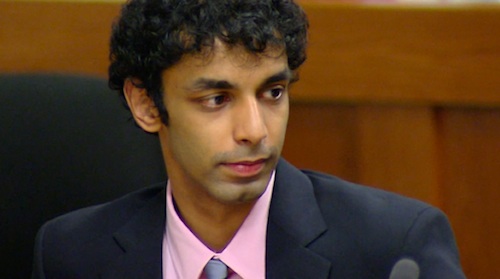
In a startling new development, the 2012 invasion of privacy conviction of an Indian American student that roiled the nation on hate crimes against gays and drew a strong reaction from President Obama, may be thrown out.
On March 17, the New Jersey Supreme Court overturned a key clause of the state’s bias crime law in the unrelated case of State v David T. Pomianik Jr. That clause greatly impacted the jury which convicted then Rutgers University student Dharun Ravi for using a Webcam in September 2010, to record his gay roommate Tyler Clementi’s sexual encounter with another man. Clementi later committed suicide and in the public mind, the shame of Ravi’s Webcam exposure caused Clementi to do so. The case hit national headlines with activists rallying behind anti-bullying campaigns and decrying what they saw as rising hate crimes against gays. Ravi claimed he was not biased against gays.
Now Ravi’s attorneys, one of whom was also involved in the State v Pomianek suit, are exuberant and determined to get the young Indian man’s conviction thrown out lock, stock and barrel on grounds that the now “unconstitutional” section of the New Jersey hate bias statute tainted the whole case against the young Indian. They told Desi Talk they are preparing the brief to appeal Ravi’s conviction around the first week of April.
New Ruling
In State v Pomianek, at issue was the constitutionality of N.J.S.A. 2C:16-1(a)(3), “a bias-crime statute that allows a jury to convict a defendant even when bias did not motivate the commission of the offense.” In overruling Section (a) (3), the court in essence said that a victim’s perception cannot be used to convict a person of hate crime. It’s ruling was based mainly on the Friend-of-the-Court brief submitted by the New Jersey Association of Criminal Lawyers led by attorney Lawrence Lustberg. This brief questioned the constitutionality of the New Jersey’s hate bias law on grounds that allowing the perception of the victim to determine hate bias was basically unconstitutional.
“This can’t be — that whether you committed a crime would depend on what is in the mind of the victim,” Lustberg told Desi Talk. “Because, to commit a criminal offense you have to know before you act that it is a crime. It’s impossible to know what’s in another person’s mind, in this case the victim (Clementi),” Lustberg asserted.
Perception- v- Intent
The court pinpointed Subsection (a)(3) of the hate crime law, which, “focuses not on the state of mind of the accused, but rather on the victim’s perception of the accused’s motivation for committing the offense,” the court said in its ruling, a copy of which was procured by Desi Talk. Applying this to the Ravi case, if the victim, in this case Clementi, reasonably believed that Ravi committed the offense of harassment with the purpose to intimidate or target him based on his being gay, Ravi is guilty of bias intimidation. During his trial, Ravi consistently held that he had no bias against gays. But under subsection (a)(3), in effect, Ravi was found guilty of bias intimidation even if he had no purpose to intimidate or knowledge that his conduct would intimidate Clementi, because of his sexual orientation. “The defendant is culpable for his words or conduct that led to the victim’s reasonable perception even if that perception is mistaken,” the court said in what it saw as an incongruity in due process law.
No other bias-intimidation statute in the nation includes Section (a)(3) according to New Jersey’s highest court, arguing that the statute as it stood during Ravi’s case failed to set a standard that would allow a person to know when they are crossing a proscribed line and instead criminalizes a defendant’s failure to foresee the reaction of the victim. In a unanimous decision the court ruled that what was more important in an alleged hate crime was what was in the mind of the perpetrator rather than what was in the mind of the victim.
Positive for Ravi
“The ruling is very positive for Dharun Ravi and creates an argument on a position I could not take before,” Ravi’s attorney Steven Altman told Desi Talk. “Now I can say that all evidence presented on how Tyler Clementi saw things so tainted the jury’s view that the whole case should be thrown out,” Altman said. This would mean vacating criminal wrong doing and vacating all of the convictions. “None of the conviction should stand.” Altman has been appealing the 2012 conviction in appellate court for the last 3 years, and the March 17 ruling strengthens his hands. Ravi was convicted on 15 counts of privacy violations and tampering with evidence charges, among them four charges on violating the bias crime law.
The evidence of what was in Clementi’s mind had come into trial only because of that “unconstitutional” provision according to the attorneys. Lustberg said the earlier New Jersey hate bias statute’s Section (a)(3) held the danger that people could be convicted of a bias crime even if they did not know they were doing something wrong. He and Altman discussed Ravi’s case in a conference call March 23, Lustberg said, and they would file their brief in the first week of April.
Judge Glenn Berman who presided over Ravi’s case said he was not at all surprised by the state supreme court’s decision, NJ.com reported March 20. Even during the case, Berman said he had characterized the hate crime law as “muddled” and foresaw it would be contested. He sentenced Ravi to 30 days in prison and community service, which the state is still contesting as too lenient. Ravi was released from prison after serving just 20 days.
Not Anti-gay
During Ravi’s trial, Indian-Americans came out to demonstrate in his favor, at one time holding up placards in front of the court where the trial was going on proclaiming – Free Dharun Ravi in large letters. A “Support Dharun Ravi” Facebook page was created, to among other things, raise funds for the case. To date, it registered 1,043 “Likes”.
In a March 22, 2012 interview with The Star-Ledger while he was out on bail, Ravi admitted he was sorry for what happened and for not considering Clementi’s feelings; that he was immature and did some stupid things. “But I wasn’t biased,” he insisted. “I didn’t act out of hate and I wasn’t uncomfortable with Tyler being gay.”





Be the first to comment